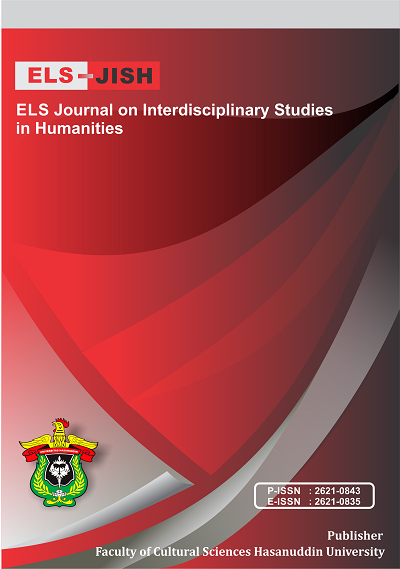The Effect of Song Learning Media and English Communicative Mastery on English Speaking Ability
DOI:
https://doi.org/10.34050/elsjish.v7i2.34907Keywords:
English Communicative Mastery, English Speaking Ability, Song learning mediaAbstract
The purpose and specific target of this research is to find out how much influence learning media learning through songs and mastery of communicative English (English Communicative) has on English speaking ability. The research method used is descriptive quantitative with survey technique. In this study, a representative sample of 90 people was taken. The data collection technique was carried out by distributing questionnaires to the object to be studied using a Likert scale. The data source is primary data, analyzed with a descriptive statistical approach to determine the frequency of answers and percentages. The results prove that the effect of song learning media and mastery of English Communicative on English speaking ability is positive and significant. There is a significant influence of song learning media and mastery of English Communicative on students' English speaking ability in South Jakarta. The regression coefficient is significant as shown by Sig value 0.000 <0.05 and Fcount 120.520. From the results obtained, it can be concluded that the long-term goal of learning by using learning media through English songs can be used as an important alternative media in mastering everyday English.
The purpose and specific target of this research is to find out how much influence learning media learning through songs and mastery of communicative English (English Communicative) has on English speaking ability. The research method used is descriptive quantitative with survey technique. In this study, a representative sample of 90 people was taken. The data collection technique was carried out by distributing questionnaires to the object to be studied using a Likert scale. The data source is primary data, analyzed with a descriptive statistical approach to determine the frequency of answers and percentages. The results prove that the effect of song learning media and mastery of English Communicative on English speaking ability is positive and significant. There is a significant influence of song learning media and mastery of English Communicative on students' English speaking ability in South Jakarta. The regression coefficient is significant as shown by Sig value 0.000 <0.05 and Fcount 120.520. From the results obtained, it can be concluded that the long-term goal of learning by using learning media through English songs can be used as an important alternative media in mastering everyday English.
References
Andini, C., Yassi, A. H., Sukmawaty. (2021). The use of honorifics in English and Buginese with special reference to bone language: A comparative study. International Journal of Innovative Science and Research Technology, 6(7), 873-877.
Aswad, M., Rahman, F., Said, I. M., Hamuddin, B., & Nurchalis, N. F. (2019). A software to increase English learning outcomes: An acceleration model of English as the second language. The Asian EFL Journal, 26(6.2), 157.
Binasdevi, M. (2022). Pengaruh Model Problem Based Learning Berorientasi Literasi Lingkungan Terhadap Keterampilan Berpikir Kritis Siswa Madrasah Ibtidaiyah. Indonesian Journal of Islamic Elementary Education, 2(1), 81-90.
Bowling, A. (2005). Techniques 17 of questionnaire design. Handbook of health research methods: Investigation, measurement and analysis, 394.
Cohen, L., Manion, L., & Morrison, K. (Eds.). (2011). Research methods in education (7th ed.). New York: Routledge Taylor & Francis Group.
Griffe, B., Brito, J. L., & Sierraalta, A. (2010). Theoretical study of Au/SAPO-11 catalyst and its potential use in thiophene HDS. Journal of Molecular Catalysis A: Chemical, 315(1), 28-34.
Lang, J. (2016). Informal Music Learning in a Canadian Secondary School Music Program. 21st Century Music Education: Informal Learning and Non-Formal Teaching, 7.
Rahman, F. (2016). The Strategy of Teaching Literature through Language-based Methods: A Communicative Approach. In Annual Seminar on English Language Studies (Vol. 1, pp. 156-170).
Rahman, F. F., Ahmad, T. W. B., Badaruddin, S., & Andini, C. (2023). Moral Values in the Film Not One Less《 一个都不能少》 张艺谋对《 一个都不能少》 电影道德价值分析. ELS Journal on Interdisciplinary Studies in Humanities, 6(2), 376-390
Richards, J. C., & Rodgers, T.S. (2001). Approaches and methods in language teaching. USA: Cambridge University Press.
Said, M. M., Rita, F., Weda, S., & Rahman, F. (2021). English Language Performance Development Through Extracurricular Activities At Faculty Of Teacher Training And Education Tadulako University Palu. PalArch's Journal of Archaeology of Egypt/Egyptology, 18(08), 388-403.
Slameto. (2010). Learning and Factors That Influence It. Jakarta, Rineka Cipta.
Smith, N. (2012). The Louisiana Recovery School District: Lessons for the Buckeye State. Thomas B. Fordham Institute.
Vandergrift, L. (2015). Researching listening. Research methods in applied linguistics: A practical resource, 299.
Yaumi, M. T. A. H., Rahman, F., & Sahib, H. (2024). Bridging Language and Technology through Semiotic Technology. International Journal of Social Science Research and Review, 7(1), 52-61.
Downloads
Published
How to Cite
Issue
Section
License
Copyright (c) 2024 Amirrudin Amirrudin

This work is licensed under a Creative Commons Attribution-ShareAlike 4.0 International License.






